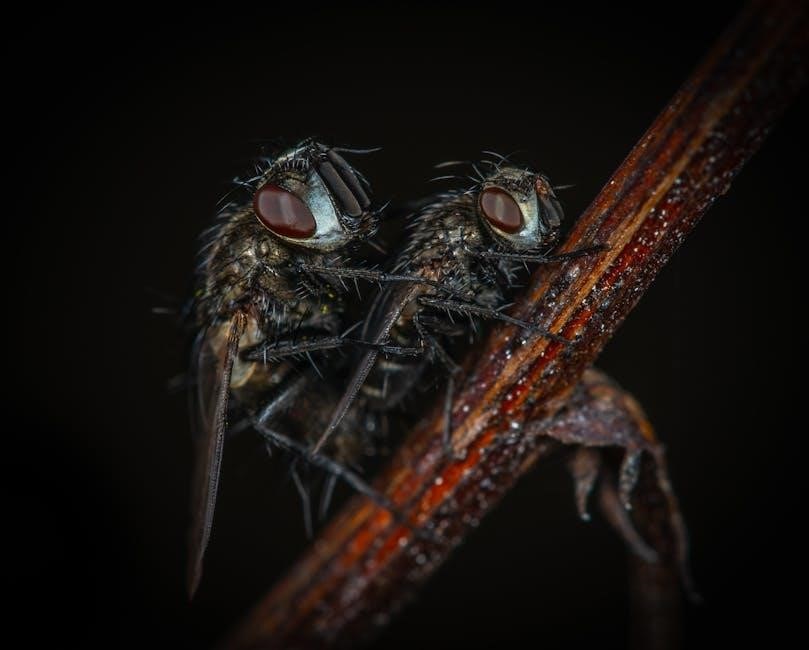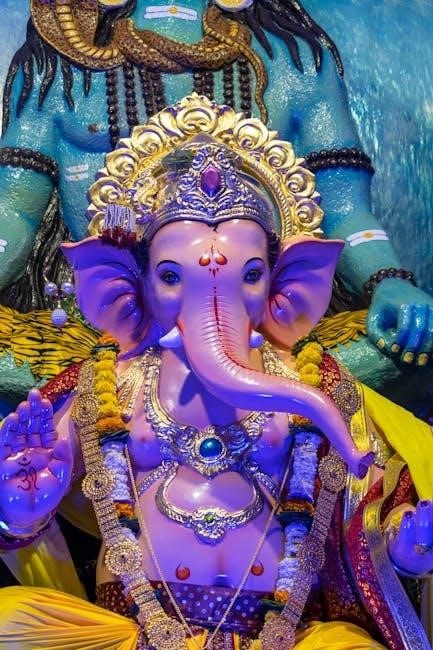William Golding’s iconic novel explores human nature through a group of stranded boys, revealing the delicate balance between civilization and savagery. A gripping tale of survival, power, and moral decay, Lord of the Flies remains a timeless classic in world literature, offering profound insights into human behavior and societal structures.
1.1 Overview of the Novel
Lord of the Flies, written by William Golding, is a thought-provoking novel that explores human nature through the story of young boys stranded on a remote island. As they attempt to govern themselves, the line between civilization and savagery blurs, revealing darker aspects of human behavior. The novel delves into themes of power, morality, and the inherent flaws in societal structures, making it a profound commentary on humanity. Its gripping narrative and deep symbolism have cemented its place as a literary classic.
1.2 Author Background: William Golding
William Golding, a Nobel Prize-winning author, crafted Lord of the Flies in 1954. Born in 1911, Golding was deeply influenced by his experiences in World War II, which shaped his pessimistic view of human nature. His unique writing style blends philosophical insights with gripping narratives, exploring themes of morality and societal collapse. Golding’s work continues to resonate globally, offering timeless reflections on humanity’s duality, as seen in the boys’ descent into chaos on the island.
1.3 Historical Context of the Novel
Lord of the Flies was written by William Golding in 1954, a period marked by post-World War II geopolitical tensions and existential introspection. The novel reflects the Cold War era’s anxieties about human nature and societal collapse. Golding’s experiences in the Royal Navy during WWII deeply influenced his exploration of violence, power dynamics, and the erosion of morality. The book critiques the idea of inherent human goodness, resonating with the intellectual climate of the mid-20th century.

Plot Summary of “Lord of the Flies”
A group of boys survives a plane crash on a deserted island, attempting to govern themselves. However, their initial camaraderie descends into chaos and savagery until rescue arrives.
2.1 Key Events in the Story
A plane crash strands a group of boys on a deserted island. They elect Ralph as leader, establishing rules and a conch shell for governance. The boys’ initial unity fades as fear of a “beast” grows. A pig’s head, symbolizing evil, is discovered, and Simon uncovers the truth about the beast. Chaos escalates with Piggy’s death, and Ralph is hunted. The novel concludes with Ralph’s rescue, highlighting humanity’s fragile balance between order and savagery.
2.2 Main Characters and Their Roles
The novel revolves around Ralph, the elected leader who symbolizes order and democracy. Jack Merridew, driven by power and hunting, represents the descent into savagery. Piggy, the intelligent voice of reason, embodies wisdom and logic, while Simon, the quiet insightful boy, uncovers the truth about the island’s “beast.” Roger, initially restrained, later embraces brutality, showcasing humanity’s darker side. These characters collectively illustrate Golding’s exploration of human nature, morality, and societal collapse.
How to Download “Lord of the Flies” PDF
To download ‘Lord of the Flies’ PDF, visit legal sources like SparkNotes or Course Hero. Free study guides and infographics are also available online for educational purposes.
3.1 Legal Sources for the PDF
Legal sources for downloading Lord of the Flies PDF include reputable platforms like SparkNotes, Course Hero, and Faber Educational. These sites offer free study guides, infographics, and summaries. Additionally, platforms like HRW provide copyrighted materials, ensuring access to authentic content. For a seamless experience, users can explore these trusted sources to obtain high-quality study aids and resources for William Golding’s novel.
3.2 Free Study Guides and Resources
Free study guides and resources for Lord of the Flies are widely available online. Platforms like SparkNotes and Course Hero offer detailed summaries, theme analyses, and quiz questions. Additionally, sites like Faber Educational provide abridged notes and extracts. Lecture notes from universities, such as the University of Washington, and GCSE study materials are also accessible. These resources include infographics, character analyses, and reading comprehension questions, making them invaluable for students seeking to deepen their understanding of the novel.

Study Guides and Analysis
Comprehensive analysis of Lord of the Flies includes summaries, theme explorations, and Freudian psychology insights. Study guides highlight symbols like the conch shell and literary devices, enhancing understanding.
4.1 Summary and Analysis of Themes
Lord of the Flies explores timeless themes such as civilization vs. savagery, power dynamics, and the loss of innocence. The novel highlights how isolation and fear lead to moral decay, as the boys’ behavior descends into chaos. Themes are reinforced through symbols like the conch shell, representing order, and the beast, embodying fear. Freudian psychology further illuminates the struggle between primal instincts and civilized behavior, making the novel a profound commentary on human nature and societal structures.
4.2 Symbols and Literary Devices
The conch shell symbolizes order and democracy, while the beast represents primal fears and the unknown. Fire serves as both a survival tool and a symbol of savagery. The island itself acts as a microcosm of society, highlighting human nature’s duality. Golding uses foreshadowing and irony, such as the naval officer’s arrival, to emphasize the contrast between civilization and savagery. These devices reinforce the novel’s exploration of morality, power, and the descent into chaos.
4.3 Freudian Psychology in the Novel
Golding’s portrayal of the boys’ behavior aligns with Freudian psychology, where the id, ego, and superego are central. Jack embodies the id, driven by primal desires for power and control. Ralph represents the ego, striving to balance reality and morality; Piggy, with his rationality and moral sense, symbolizes the superego. The novel illustrates the struggle between these psychological forces, reflecting how societal constraints are necessary to suppress humanity’s inherent savagery and maintain order.
Themes and Symbols in “Lord of the Flies”
The novel explores themes of civilization vs. savagery and human nature’s duality. Symbols like the conch shell represent order and democracy, while the beast embodies fear and chaos, reflecting the boys’ inner struggles and societal breakdown.
5.1 Civilization vs. Savagery
The novel vividly portrays the conflict between civilization and savagery through the boys’ behavior. Initially, they cling to societal norms, but isolation erodes their civility, revealing primal instincts. The conch shell, a symbol of order, gradually loses its power as chaos prevails. The beast, a feared entity, embodies their collective fears, driving them toward savagery. This duality highlights humanity’s fragile balance between reason and instinct, questioning whether civilization is innate or merely a learned behavior;
5.2 The Conch Shell as a Symbol
The conch shell is a powerful symbol of order, democracy, and civility in the novel. Found by Piggy, it is used to summon gatherings and ensure fair speech. Whoever holds the shell has the right to speak, maintaining decorum among the boys. As the story progresses, the shell’s influence wanes, reflecting the decline of civilization. Its destruction symbolizes the complete collapse of societal norms, leaving the boys in a state of chaos and anarchy, underscoring the novel’s exploration of human nature.
Character Analysis
The novel delves into the psychological and moral development of its characters, particularly Ralph and Piggy, showcasing their struggle to maintain order amidst chaos. Their distinct personalities and roles highlight the conflict between leadership, reason, and savagery, central to the story’s exploration of human nature and societal collapse in Lord of the Flies.
6.1 Ralph: The Natural Leader
Ralph, with his charm and natural leadership abilities, emerges as the leader of the group. He prioritizes building shelters and maintaining a signal fire, showcasing his practicality and responsibility. His commitment to democracy and order reflects his belief in civilization. However, Ralph’s leadership is challenged by his own fears and the group’s descent into savagery. Study guides highlight his internal struggles, balancing his desire for power with the need to protect his followers, making him a complex and dynamic character in Lord of the Flies.
6.2 Piggy: The Voice of Reason
Piggy, the intelligent and rational member of the group, serves as the moral compass in Lord of the Flies. Despite his physical limitations, he provides logical solutions and advocates for order. His possession of the conch shell symbolizes his right to speak and share ideas. Piggy’s resentment towards being overlooked highlights his struggles for recognition. Study guides emphasize his role in maintaining civility, as he consistently reminds the boys of their goal to be rescued, showcasing his wisdom and commitment to reason amidst chaos.
Educational Resources and Study Materials
Access comprehensive study guides, infographics, and lecture notes for Lord of the Flies. These resources provide summaries, analysis, and insights to enhance understanding and academic preparation.
7.1 Lecture Notes and Summaries
Lecture notes and summaries for Lord of the Flies provide detailed analyses of chapters, themes, and characters. Resources like the University of Washington’s notes on Chapter 10 offer insights into key events and symbolism. Additionally, summaries from educational platforms highlight Freudian psychology and its relevance to the novel. These materials are designed to help students grasp complex concepts, prepare for exams, and deepen their understanding of Golding’s work. They are available for download and serve as valuable study aids.
7.2 Exam Preparation Guides
Exam preparation guides for Lord of the Flies are designed to help students excel in their studies. These guides include chapter summaries, thematic analyses, and practice questions. Resources like Freudian psychology overviews and study infographics provide deeper insights into the novel. Additionally, GCSE-specific guides offer tailored revision materials, ensuring students are well-prepared for exams. These tools are available as downloadable PDFs, making them accessible for thorough review and last-minute study sessions. They are essential for achieving top grades in literature exams.

Essay Topics and Discussion Questions
Essay topics for Lord of the Flies include analyzing the conch shell’s symbolism, Ralph’s leadership qualities, and the novel’s exploration of human nature. Discussion questions might focus on how the boys’ behavior reflects societal norms or the role of fear in decision-making. These prompts encourage critical thinking about themes like power, morality, and survival, making them ideal for deep academic exploration and class debates.
Online Courses and Tutorials
Online courses and tutorials on Lord of the Flies offer in-depth analyses and study resources. Platforms like Coursera and edX provide structured lessons, while sites like Course Hero and SparkNotes offer video guides and interactive tools. These resources cover themes, character development, and literary devices, helping students grasp the novel’s complexity. Additionally, many tutorials include quizzes, discussion forums, and downloadable materials, making them invaluable for both independent and classroom learning experiences.

References and Further Reading
For deeper exploration, refer to SparkNotes’ official guide, offering detailed summaries and analyses. Course Hero provides video study guides and infographics. The University of Washington’s lecture notes on Chapter 10 are insightful. Additionally, HRW’s copyrighted materials and Faber’s educational notes are excellent resources. These sources enrich understanding and provide comprehensive analysis of themes, characters, and literary devices, aiding both students and enthusiasts in their study of Lord of the Flies.
Final Thoughts on the Novel’s Relevance
Lord of the Flies remains a timeless exploration of human nature, offering profound insights into civilization, savagery, and morality. Its themes of leadership, power, and societal collapse resonate universally, making it a must-read for understanding human behavior. The novel’s ability to provoke reflection on what humanity might descend into without societal constraints ensures its enduring relevance. For students and educators alike, it serves as a vital lens for analyzing group dynamics and the fragility of human decency.




